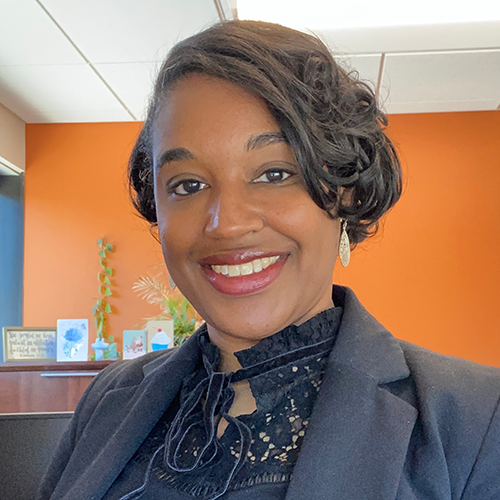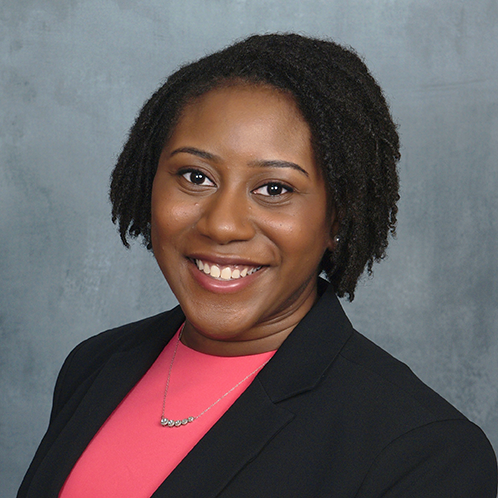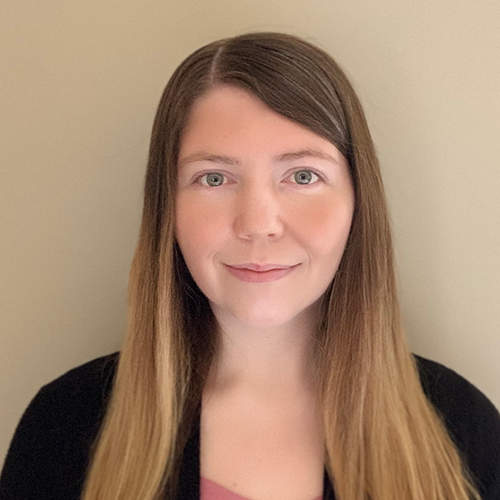Child Welfare Stipend Program at VCU: A strong social work legacy supporting the commonwealth
As a newly minted VCU M.S.W. graduate in 2003, Danika Briggs signed on for 18 months with a local Virginia Department of Social Services office.

Now, nearly 19 years later, she’s still with DSS, currently assistant director for family services with the Chesterfield-Colonial Heights Department of Social Services.
Briggs, a licensed clinical social worker, is typical of the graduates that the Title IV-E Child Welfare Stipend Program at VCU produces: caring, committed and a leader in the field of child welfare.
In partnership with Virginia DSS, the CWSP provides students with specialized training and field placements to prepare for a career in public child welfare. VCU administers the program through the School of Social Work as one of the four universities working with VDSS on this project.
Funded through Title IV-E of the Social Security Act, the program provides a $10,000 stipend for up to two academic years to B.S.W. and M.S.W. students. In exchange, graduates complete a payback requirement to work at a local DSS in Virginia, one calendar year for each academic year they were in the program.
“The CWSP affords you the opportunity to experience child welfare firsthand through your field placement while also learning about child welfare policies and practices through your coursework,” Briggs says. “I credit my years as a child welfare worker as essential in helping me grow as a clinician because I was able to understand the complexities people experienced in their natural environments outside of therapy.”
CWSP ALUMNI
We want to connect with graduates of the Title IV-E Child Welfare Stipend Program at VCU! If you are a CWSP alum, please fill out this form.
CONSIDERING A CHILD WELFARE CAREER?
Learn more from our CWSP alumni as they separate fact from fiction.
MARCH 2 APPLICATION DEADLINE
View the eligibility details and application for incoming M.S.W. students and current B.S.W. students for the 2022-23 year.
The first incarnation of the CWSP had its heyday in the 1990s, with funds to support cohorts of 24-32 students each year, according to former School of Social Work faculty member Mary Katherine O’Connor, Ph.D., who ran the program. Students were placed in agencies in urban, exurban and rural areas, and “supervisors/field instructors employed by the CWSP and approved by the administration of each local DSS office were charged with the responsibility of seeing this as an intervention into the system, as well as a way to help students know about public child welfare,” O’Connor says. “The original design was pretty revolutionary in my mind.”
After going dormant for seven years from a lack of funding, the CWSP was reinstated five years ago, in January 2017. A total of 14 students graduated in 2018 and 2019. That number has increased to 29 graduates in 2020 and 2021.
“It is a crucial time for social workers to specialize in child welfare practice as practitioners and researchers grapple with the history of child welfare and current implications for practice,” says Naomi Reddish, M.S.W., a CWSP alum who currently coordinates the CWSP at VCU. “Child welfare practitioners have been working with policy makers to shift the child welfare system toward prevention and to work toward better outcomes for youth currently in foster care; there is so much important work to do.”
CWSP curriculum and field placements
Other CWSP alumni pointed to their field placements, specialized course offerings and additional resources, such as trainings, as key benefits that helped prepare them to work as professionals.
Beth Hall, 2019 M.S.W. graduate
Beth Hall, who has worked with Fairfax County as a social services specialist and now as a behavioral health clinician in residence, highlighted a course on the history of child welfare, along with trainings such as trauma-informed practice and VDSS-specific best practices (Practice Profiles, Practice Model and Commonwealth of Virginia Learning Center trainings).
“I was also able to infuse child welfare history, practice and clinical skills into every assignment I completed in my program. I intentionally completed both years of internship within a local DSS, so I was able to tailor those experiences and assignments with a child welfare focus. …
“CWSP granted me the opportunity to specialize in a particular realm of social work and gain valuable, direct experience in the field with which I am currently working. I am confident that the primary reason I secured my position with Fairfax DFS is because of the experiences I had with CWSP. …
“I cannot emphasize enough the importance of simultaneously practicing what you are learning in the classroom in the field – there is nothing that will help you grow in your practice like real-time feedback from families and other professionals.”
April Watson, 2008 M.S.W. graduate
April Watson, family services supervisor in foster care/adoption/resource home coordination with the city of Lynchburg DSS, was part of the original CWSP and credits the variety of field placements she received as a student.
“I completed two field placements. One was in a rural community and the second was in a larger city. One of the things that struck me the most was how different the availability of resources was. The rural community did not have public transportation and had very few service providers within the community. They often had to go 45 minutes to an hour from their homes to a city that had a variety of service options; however, transportation was often a barrier. In the city, there were hundreds of youth in foster care that would soon be aging out of care. I had two completely different experiences, and both placements were equally valuable.”
Watson also praised the Virginia Learning Center trainings and her research course, saying she has continued to follow her research topic, what makes a successful foster parent. “Even though I was on the clinical track I still use a lot of this information today. I especially love qualitative data and believe that listening to the voices of the families we serve is our best tool in truly supporting families. …
“Taking the required Virginia Learning Center courses prior to graduation was extremely valuable. Having the training and hands-on experience in local child welfare agencies was instrumental. Not only is it great on a resume, but you already have experience when you walk in the door for employment.”
Shentel Meadows, 2021 B.S.W. graduate
Shentel Meadows completed field practicums at Richmond City DSS and Chesterfield-Colonial Heights Social Services.

“The social work program focuses on competence and integrity. The CWSP has approximately two trainings every month that will further the knowledge and level of awareness for current and future social workers. Social workers are constantly learning. As the world continues to develop, social workers are developing with it. The CWSP at VCU provides students with a space to learn and grow. …
“My field placements have made me more confident in becoming a working professional. I am able to see firsthand how the system works. I am able to put theories and techniques that I’ve learned in the classroom into practice. My field liaisons, field instructors and task supervisors provide me with an environment to work firsthand with the community and court systems. I have been able to practice proper documentation, which is essential for social workers.”
Rachel Boles, 2021 M.S.W. graduate
Rachel Boles is a family services specialist at the Mathews County Department of Social Services in Virginia.

“As a CWSP student, I was able to participate in a series of motivational interviewing trainings, which I feel were integral to my work in the child welfare field. In my courses, we tended to touch on motivational interviewing and get a brief glimpse of it, but these trainings offered by the CWSP gave me the opportunity to not only better understand what motivational interviewing is and when it can be beneficial, but also to practice skills associated with motivational interviewing. …
“I chose to apply to the CWSP at VCU because I wanted to know more about how the foster care system worked, I wanted to be more a part of decision making in these cases, and I wanted to be able to eventually try to make changes to the system once I understood it better.”
The need in Virginia
With staff turnover and a high volume of community needs, DSS offices require the continual infusion of talent that CWSP graduates bring. This has never been more true than during the pandemic, as all business sectors are facing staffing shortages.
Briggs says caseloads vary across service programs within DSS. Despite a 2018 Joint Legislative Audit and Review Commission report on Virginia’s foster care system that recommended caseloads not to exceed 15, Briggs says that number can grow as high as 18 for more senior staff.
“That can impact the quality and thoroughness of the services provided,” she says. “Our families present with very complex needs. It takes time to engage with families, to get to know their stories and better understand some of the root causes that have resulted in our involvement. When staff have higher caseloads, they make diligent efforts to respond to immediate needs and safety concerns; however, issues may still persist because we are just putting a Band-Aid over the wound versus treating the wound.”
The existing child welfare workforce needs new colleagues to join them in the field who are critical thinkers, diligent workers, full of compassion and agents of change.
– Naomi Reddish
Watson says her office strives for caseloads of 12 to 15. She has seen both extremes – caseloads of 8 to 10, “exciting times because staff has time to do all of the best practice pieces”; and a period when some staff had 40 or more children in their caseloads.
“Numbers that high do not allow for true engagement to occur,” she says. “When DSS agencies lack adequate staffing and services, children and families are directly impacted in many ways. When agencies are understaffed it often means that current staff are responsible for managing a majority of the cases. This is stressful for the worker, can negatively impact permanency outcomes, and leads to worker burnout.
“We know typically when a case gets reassigned it delays permanency for children and families.”
For a child at risk of abuse and neglect, inadequate staffing or lack of services could mean that children are not seen in a timely manner and could potentially be exposed to additional risk of abuse and neglect. For youth in foster care, their agency may not have the time or resources to diligently search for family members that can serve as a support, connection or placement.”
Hall was “averaging 5-8 cases per month, and we are expected to balance up to 12 cases at a time. Fairfax County operates from a risk dosing methodology, so we meet with families more than the state minimum of one time per month. For example, a family with a risk level of ‘Very High’ requires four contacts per family member per month.”
Continuing to grow the pipeline, Reddish is in the midst of recruiting her sixth cohort that will start in Fall 2022, and has an expected graduating group of 12 for May and three for August 2022.
“During the pandemic worker turnover has increased, which significantly impacts children and families,” she says. “The existing child welfare workforce needs new colleagues to join them in the field who are critical thinkers, diligent workers, full of compassion and agents of change.
“We also need more continuing education and support for our child welfare supervisors, as they bear so much responsibility in a system in need of significant changes for the workforce to live into our values of family engagement and equity. The intention of the work of the CWSP at VCU and statewide is to be a part of meeting these needs.”
Categories Alumni, Community, Education